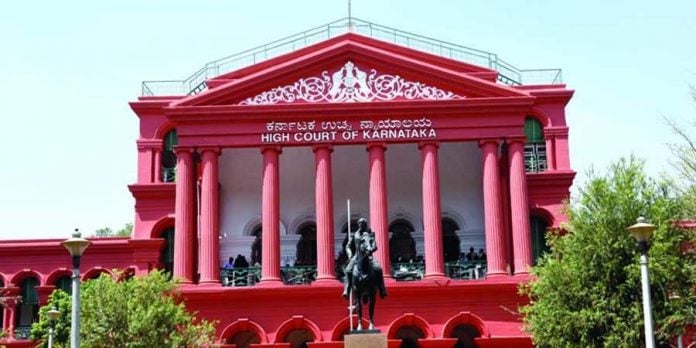The Karnataka High Court today appealed to the student community and the public at large to maintain peace and tranquility in the wake of protests against a government order, which bans the wearing of hijab (headscarves) by Muslim students.
The Court was hearing a batch of petitions arguing that colleges in the state were discriminating against female Muslim students by denying them entry on the sole ground that they were wearing a hijab.
Justice Krishna S Dixit observed that the Court will go by the Constitution, keeping the emotions aside.
“The Constitution is above the Bhagwad Gita for me. I will go by the oath I have taken to the Constitution,” he observed.
Appearing for the state government, Advocate General Prabhuling Navadgi submitted, “We have given autonomy to the college development committees to decide the uniform and the students will abide by it.”
Senior Advocate Devadatt Kamat, appearing for the petitioners, countered that the state’s stand was not so innocuous. He went on to make four-fold arguments:
- Wearing of head scarf (not burqa or veil) is an essential part of Islamic religion;
- Wearing of hijab is protected by right to expression under Article 19(1)(a) and can be restricted only on grounds under Article 19(6);
- Wearing hijab is a facet of the right to privacy recognised as part of Article 21 by Puttaswamy judgement of Supreme Court;
- Government order is outside the scope of the Karnataka Education Rules and State has no jurisdiction to issue the same.
He went on to argue, “State cannot say what is an essential practice of a religion and what is not. That is the sole domain of Constitutional courts.”
Kamat further submitted that the government order was based on a judgment of the Kerala High Court which held that wearing of hijab was not part of the essential religious practice of Islam. However, he said that this judgment was not applicable to the present case.
“This is because the Kerala High Court decision was not in the context of wearing hijab in a government institution, but it dealt with such right in a private Christian institution,” he said.
He further contended, “Personally speaking, I may not subscribe to the view that children have to cover their heads. But courts have held that we are not to sit in judgment over someone who wants to do it.”
When Kamat claimed that hijab wearing students were forced to sit separately in one institution, the Advocate General objected.
The Court recorded the objection made by the AG, stating, “AG vociferously refuted submission of Mr Kamat on the segregation of students. He (AG) stated that such baseless statements should not be made, which could have dangerous consequences in a sensitive society like ours.”
In view of the facts that exams are approaching, and that the petitioners have been exercising their right to wear hijab for the last two years, Kamat prayed that they be granted interim relief by being allowed to attend classes for now.
AG Navadgi pleaded that given the law and order situation, protests and demonstrations against the government order should not be allowed to take place.
The Court ultimately recorded in its order, “Having heard counsel for the parties and pending further hearing of matter, this Court requests the student community and the public at large to maintain peace and tranquility.”
The first petitioner alleged that Government PU College, located in Udupi, stopped her and other female Muslim students from attending classes on the ground that they wear a hijab (headscarf). She contended that the freedom of conscience and the right to religion are both guaranteed by the Constitution, despite which she and other girl students were singled out arbitrarily for belonging to the Islamic faith.
Further, the manner in which they were ousted created a stigma against them among her batchmates, affecting their mental health as well as their future prospects, it was submitted. The plea claimed that wearing of hijab was an essential part of Islam and enjoys protection under Article 25(1) of the Constitution, which confers the right to freely profess, practise and propagate religion.
Most recently, two more Muslim students pursuing the BBA (Bachelor of Business Administration) course at Bhandarkar College of Art and Science in Kundapura approached the Court with a similar grievance.
This plea stated that the petitioners, like other Muslim students, have been wearing a headscarf over their college uniform from the time they started studying in the college, and that there is a specific provision in the college rulebook which permits Muslim girl students to wear a headscarf.
However, for the first time on February 3, the petitioners and other Muslim girl students were prevented from entering the college and attending classes by the Principal and staff, who told them that there was a government order against wearing a headscarf. The following contentions were also raised in this plea:
- There is no rule under the University Grants Commission (UGC) Act which prescribes a uniform for college students or puts any restriction on clothes, apart from not permitting indecent attire;
- Pushing and throwing out girl students without any reason denies them their fundamental right to education, and is inhuman and immoral;
- The headscarf is an essential practice of the local and religious culture, and is hence protected under Article 25 (freedom of religion) of the Constitution of India;
- The college is acting under the instructions of the MLA Halady Srinivas Shetty, who is interfering in the management of the college for his own political interests.


